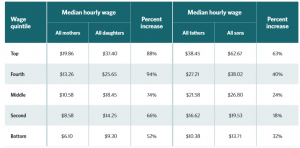
The two universities analyzed World Gallup Poll data that was gathered from 1.7 million people in 164 countries and cross-referenced earnings with life satisfaction. The results of the study were published in the journal Nature Human Behavior.
The study acknowledged that costs and standards of living varied among the countries included in the study and factored that into their conclusions.
The upshot for Americans was that an ideal income for individuals is $95,000 per year to obtain life satisfaction. Emotional well-being, the study showed, is achievable at $60,000 to $75,000 per year. Families with children, of course, will need more.
The researchers defined life satisfaction as an overall assessment of how one is doing financially. Emotional well-being related to day-to-day feelings such as happiness, sadness, excitement, anger, etc.
The extensive survey also indicated that once a threshold was reached, additional increases in income actually were associated with reduced happiness, indicating that the more people have, the more they want. They tend to compare themselves with others more often.
There is a happiness “tipping point,” the researchers concluded., related to how well an individual feels about money. A small decline in earnings causes one to relate with others who make slightly lower incomes, perhaps because of the costs that come with higher incomes, said Andrew Jebb, lead author of the study and a doctoral student at Purdue.
He noted that the findings of the large study raise issues about money and happiness across cultures. “Money is only part of what really makes us happy and we’re learning more about the limits of money.“



